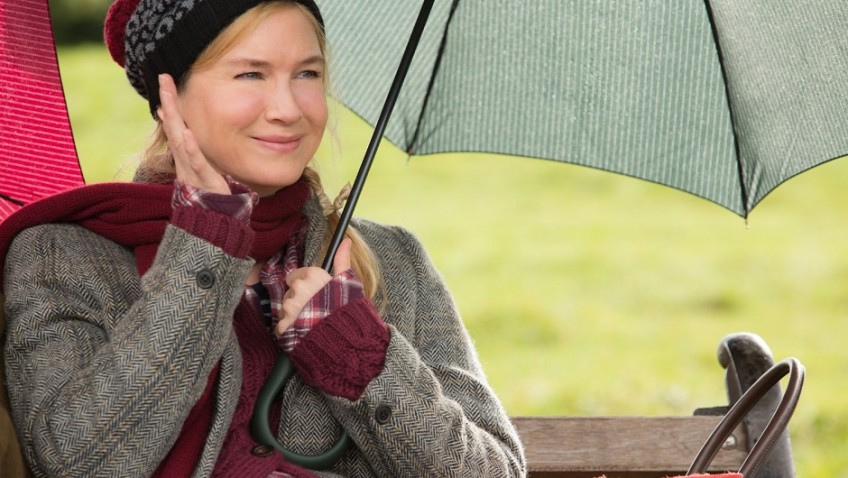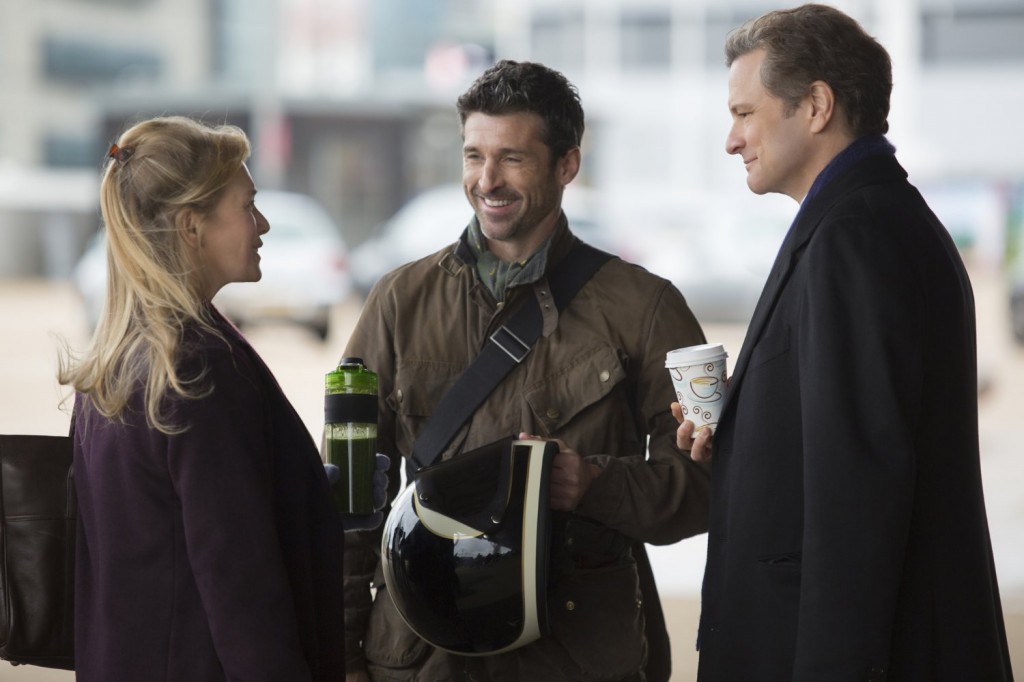Joyce Glasser reviews Bridget Jones’s Baby (September 16, 2016)
There is no denying that the ‘Bridget Jones’ movies are crowd pleasers. Sharon Maguire’s Bridget Jones’ Diary, a clever update of Pride and Prejudice, was a critically acclaimed hit and Renée Zellweger was rightly nominated for an Academy Award. Not a trace of Jane Austen, or anything else, remained in Beeban Kidron’s dire sequel, Bridget Jones: Edge of Reason, but it still made a mint. Twelve years later and Maguire is now directing the sequel that not even Fielding envisaged. Unlike the first two, Bridget Jones’s Baby is not based on a novel, but on a desire to milk a cash cow for all it is worth. And, judging from the laughter at the packed screening I attended this intermittently funny and cringeworthy film about finding motherhood and Mr Right in your forties will be a smash hit.
Despite the constraints of Botox, the immensely talented Zellweger is still the reason to see this film. That said, she has some competition from a scene-stealing Emma Thompson. Thompson was apparently called in to polish the script, but she takes on the role of a cynical obstetrician, giving herself the best lines. Hugh Grant declined to return, but Colin Firth is back, with his by now recognisable dry reserve, hiding horror, embarrassment and tenderness in equal measure. While Bridget makes the gaffes, it is hard to tell which of the two is more uncomfortable in social situations.
Now that Bridget is a slim, attractive woman with a great job as a TV news producer, it is harder for lonely, overlooked size 14-16 office workers the world over to identify — or figure out why Bridget hasn’t moved to a larger flat. Given the ending of Edge of Reason, we also expect her to be happily married to Mark Darcy (Colin Firth) although if she were, there would not be a film.
With the oversized knickers and undersized job a thing of the past, the film depends more than ever on embarrassing Bridget with gaffes, a few of which are truly funny. The first comes early on when Bridget’s work colleague, Miranda (Sarah Solemani), surprises her inadequately dressed producer with an invitation to a music festival. Cleverly targeting that elusive age gap between 40-something women without children and popular youth culture, the two women ask a 20-something man at the bar (who looks like an employee at their local Starbucks) to take their photo.
To impress their friends, they request that he include in the background the ‘guy from Bargain Hunt’ (a silent cameo from Tim Wonnacott). The young man – world famous, six-times platinum record winner Ed Sheeran – naturally assumes they want him to be in the photo and is left bemused. Later, when the friends see Sheeran performing, they joyfully exclaim, ‘look, there’s that guy from Starbucks!’
It is a much bigger gaffe when Bridget finds herself knocked up after two one-night stands in succession. The first is with high-tech guru Jack Qwant (Patrick Dempsey) who lifts her out of the mud at the music festival. Qwant, ironically, is famous for his matchmaking app which operates on a patented algorithm (clearly in contrast to Bridget). We are not meant to ask what a handsome, brilliant, famous and eligible millionaire is doing all by himself in a yurt at a music festival where he is unrecognised. The second one-night stand is with Darcy who (following Edge of Reason) apparently gave up on Bridget, married someone else and is now divorced and longing for Bridget.
There is a problem, however. The film depends on two suitors — previously Colin Firth and Hugh Grant, now Firth and Dempsey – competing over Bridget. At the same time it must capitalise on the current baby boom and perhaps the appeal of Judd Apatow movies like Knocked Up and This is 40, in order to include all the tropes of the romcom/baby genre (birthing classes, baby books, ultrasounds to gladden the hearts of the anti-abortion lobby, traffic jams on the way to the hospital, and the pain that men cannot imagine etc.).
So how do you sustain two competing men when there is one pregnant woman with one baby? The solution is to turn bungling, warm-hearted, self-effacing Bridget into cruel, self-serving and selfish Bridget. Refusing to wait for the baby to be born or an early DNA test, she tells each suitor that he is the father, and then, after they profess their willingness to recognise the baby and start painting the nursery, tells them they might not be. At this point, I felt like walking out on Bridget, but miraculously, both men play the attentive dad-to-be like obedient dogs. Bridget’s disregard for their feelings and her toying with their desire to be fathers, is sexism in reverse.
We are intended to laugh as Bridget is referred to as a ‘geriatric mother, but not at the fact a 43-year-old, who has never managed to be pregnant in 15 years, suddenly, with no fertility treatment or effort, gets pregnant during a one night stand. There is no mention of a difficult pregnancy or an abnormal baby – and of course, both are perfect. In addition, Gemma Jones is back as Bridget’s batty mother, running for office and protesting, we think, too much, about her inclusive campaign championing gays and single pregnant women. These jokes are past their sell by date and leave poor, wasted Jim Broadbent (Bridget’s dad) with nothing to do.
Bridget Jones has been a role model for women in the workplace (not just any workplace, of course, but publishing and ‘media’, areas in which all young women want to work). At the start of this film, Bridget takes solace in her professional life, but without the gaffes, there is no movie. So she trips through the news room foot in mouth, failing to distinguish an Asian dictator from his chauffeur, and feeding nonsense to her apparently ignorant, spike-heeled news reader /TV host (Miranda) who dutifully regurgitates Bridget’s personal questions to their guest. That guest is none other than an increasingly uneasy and suspicious Jack Qwant.
Many will find this funny, but Bridget is so unprofessional that it is difficult not to side with Alice (Kate O’Flynn, superb), the tough, vulgar young whippersnapper appointed to revamp the news. So what could have been a great opportunity to comment on older women’s irrelevance in the workplace, becomes a self-fulfilling prophecy. Twenty-five years ago women struggled to be taken seriously as news readers and today most are experts in current affairs, many writing their own stories and doing their own research. No boss would tolerate a producer as unreliable and immature as Bridget, so this portrayal of a feminine news duo is, ironically, uncomfortably sexist.





